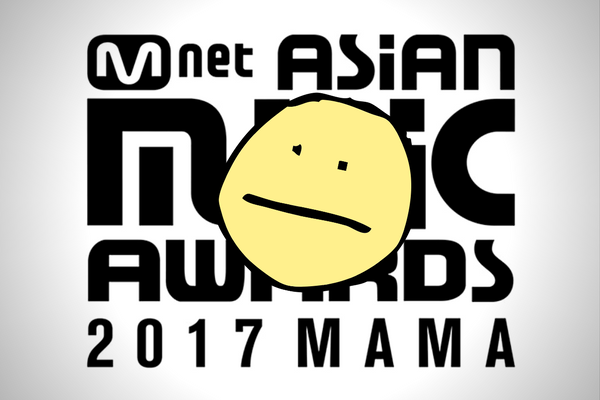The award show could be hosted on every continent and still fail. Simply put, the Mnet Asian Music Awards is not really for Asia and doesn’t represent it.

This year Mnet is trying something different this year: it will hold Mnet’s Asian Music Awards (MAMA) in three different cities over the course of a week. The different venues, one in Vietnam, Hong Kong, and Japan will finally be a true celebration of Asia’s entertainment scene, a feat that MAMA aspired to.
The problem, however, is that this is not true. Mnet’s award event has never really been a show for Asia. It has failed to represent the diverse entertainment communities that it contains. Adding different host cities to the list won’t change this. So, Mnet either needs to make dire alterations or adjust its name to reflect reality.
Why? Because MAMA has never been an international show in any way other than location. The award show and entertainment companies behind it have consistently illustrated their lack of knowledge and respect of other Asian entertainment fields, and as such have never and will never be able to pull off a show that will live up to its claim as the “greatest music award show in Asia.
“MAMA has a disproportionate representation of Korean artists”
On the winner’s page (see video or link here) there are three categories that have subcategories for awards. The first listed on the page is the “Korean Category”. The other two categories are “Best Asian Artist” and the last one was “Professional Category”.
The “Best Asian Artist” has six listed winners and the last category awards those recognized for sound engineering, choreography, and more; this category has a total of eight winners. However, the issue with these two categories is that they are almost completely designated to acknowledge Asian artists that are not Korean.
To put this into perspective, the “Korean Category” has 23 different categories with subsequent winners. This totals more than the other two categories combined. Moreover, the “Best Asian Award” encompasses the “best artist”, one each, for China, Japan, Singapore, Thailand, Indonesia, and Vietnam.
Do different genre’s of music not exist elsewhere? Are there only soloist outside of Korea? Is only one gender allowed to create music for China, Japan, Singapore, etc.? Well, golly, if that’s the case the U.N. must be made aware!
This reaction may seem a bit dramatic, but the fact is that by not having fully developed award categories for other countries they are consequently minimizing their markets and trivializing their diversity and importance.
Furthermore, this lack of representation is again illustrated by the performances, awards announcers, and on-screen time. Take a look at Mnet’s official playlists for MAMA 2016 (here, here, and here) and count how many performances were made by non-Korean artists. Have you done it? If you didn’t, the count is, amazingly, a grand total of 0.
In summary, the award show has a disproportionate representation of Korean artists that does not align with its claim and name.
What Mnet Needs to Do
So, what exactly can Mnet do to improve? Well, I’ve compiled a relatively short list of Suggestions for the company.
First, it must expand its representation of different artists who perform, win and announce awards.

One option is to eliminate the “Korean Category” and put all the different countries’ artists on the same level of evaluation for awards such as best female artist.
Another option is to replace “Best Asian Artist” category with an expanded sections dedicated to each country.
Second, to accomplish the first suggestion it needs to establish and standardize communication and officiate a language. This means that all media needs to be in this language including announcements and award presentations. This standardization will help fluidity and understandability throughout the course of the show.
English is the most likely candidate since it is the current universal language, but this does not need to be the case. It can also be Korean, Chinese, or even change depending on location. However, this does create other issues such as ensuring that attendees not fluent in the chosen language are able to follow along. This issue will likely call for instant translations of speeches, but pre-translations for scripted or filmed segments. Although there are some issue, the benefits outweigh any possible problems.
Lastly, Mnet it should take advantage of the location of the show, especially if it plans to continue hosting the show in different cities. It would be a great opportunity to incorporate some local culture into the show.
Additionally, Mnet needs to be extra careful when it comes to spelling and pronunciation. In the past, the show has had a number of errors presenting correct names. If awards are going to be given to artists from different countries correctly spelling and pronouncing their names becomes paramount.
Mnet’s Korean Music Awards?
There a lot of other issues with the award show, but this really is one of the most pressing. If this award show fails to rectify these problems, then it really isn’t an “Asian Music” award show, but a K-pop festival with some diversity thrown in. And if that is the case it should change its name to reflect that. How does Mnet’s Korean Music Awards sound? It’ll basically be just like KCON, but with some metal statues thrown in.
By O.C





![[TEASER] Taeyeon Releases Video Teaser for Her Single ‘Four Seasons’](https://kpoplove.koreadaily.com/wp-content/uploads/2019/03/maxresdefault-14-218x150.jpg)
![[M/V] Baek Yerin Ends 2-Year Hiatus with ‘Maybe It’s Not Our Fault’](https://kpoplove.koreadaily.com/wp-content/uploads/2019/03/sddefault-2-218x150.jpg)
![[M/V] Red Velvet Yeri Releases New Song ‘Dear Diary’ on SM Station](https://kpoplove.koreadaily.com/wp-content/uploads/2019/03/maxresdefault-13-218x150.jpg)
![[HOT CLIP] Park Bom Performs ‘Spring’ Live for the First Time at Showcase](https://kpoplove.koreadaily.com/wp-content/uploads/2019/03/maxresdefault-12-218x150.jpg)







